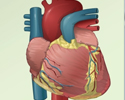Interstitial nephritis
Tubulointerstitial nephritis; Nephritis - interstitial; Acute interstitial (allergic) nephritis
Interstitial nephritis is a kidney disorder in which the spaces between the kidney tubules become swollen (inflamed). This can cause problems with the way your kidneys work.
Causes
Interstitial nephritis may be temporary (acute), or it may be long-lasting (chronic) and get worse over time.
The acute form of interstitial nephritis is most often caused by side effects of certain drugs.
The following can cause interstitial nephritis:
- Allergic reaction to a drug (acute interstitial allergic nephritis).
- Autoimmune disorders, such as anti-tubular basement membrane disease or Kawasaki disease.
- Infections.
- Long-term use of medicines such as acetaminophen (Tylenol), aspirin, and nonsteroidal anti-inflammatory drugs (NSAIDs). This is called analgesic nephropathy.
- Side effect of certain antibiotics such as penicillin, ampicillin, methicillin, and sulfonamide medicines.
- Side effect of other medicines such as furosemide, thiazide diuretics, omeprazole, triamterene, and allopurinol.
- Too little potassium in your blood.
- Too much calcium or uric acid in your blood.
Symptoms
Interstitial nephritis can cause mild to severe kidney problems, including acute kidney failure. In about half of cases, people will have decreased urine output and other signs of acute kidney failure.
Symptoms of this condition may include:
- Blood in the urine
- Fever
- Increased or decreased urine output
- Mental status changes (drowsiness, confusion, coma)
- Nausea, vomiting
- Rash
- Swelling of any area of body
- Weight gain (from retaining fluid)
Exams and Tests
The health care provider will perform a physical exam. This may reveal:
- Abnormal lung or heart sounds
- High blood pressure
- Fluid in the lungs (pulmonary edema)
Common tests include:
- Blood chemistry
- BUN and blood creatinine levels
- Complete blood count
- Kidney biopsy
- Kidney ultrasound
- Urinalysis
Treatment
Treatment depends on the cause of the problem. Avoiding medicines that lead to this condition may quickly relieve symptoms.
Limiting salt and fluid in the diet can improve swelling and high blood pressure. Limiting protein in the diet can help control the buildup of waste products in the blood (azotemia), which can lead to symptoms of acute kidney failure.
If dialysis is necessary, it usually is required for only a short time.
Corticosteroids or stronger anti-inflammatory medicines such as cyclophosphamide can sometimes be helpful.
Outlook (Prognosis)
Most often, interstitial nephritis is a short-term disorder. In rare cases, it can cause permanent damage, including long-term (chronic) kidney failure.
Acute interstitial nephritis may be more severe and more likely to lead to long-term or permanent kidney damage in older people.
Possible Complications
Metabolic acidosis can occur because the kidneys aren't able to remove enough acid. The disorder can lead to acute or chronic kidney failure or end-stage kidney disease.
When to Contact a Medical Professional
Contact your provider if you have symptoms of interstitial nephritis.
If you have interstitial nephritis, contact your provider if you get new symptoms, especially if you are less alert or have a decrease in urine output.
Prevention
Often, the disorder can't be prevented. Avoiding or reducing your use of medicines that can cause this condition can help reduce your risk. If needed, your provider will tell you which medicines to stop or reduce.
References
Neilson EG. Tubulointerstitial diseases. In: Goldman L, Schafer AI, eds. Goldman-Cecil Medicine. 26th ed. Philadelphia, PA: Elsevier; 2020:chap 114.
Perazella MA, Rosner MH. Tubulointerstitial diseases. In: Yu ASL, Chertow GM, Luyckx VA, Marsden PA, Skorecki K, Taal MW, eds. Brenner and Rector's The Kidney. 10th ed. Philadelphia, PA: Elsevier; 2020:chap 35.
Tanaka T, Nangaku M. Chronic interstitial nephritis. In: Feehally J, Floege J, Tonelli M, Johnson RJ, eds. Comprehensive Clinical Nephrology. 6th ed. Philadelphia, PA: Elsevier; 2019:chap 62.
Review Date: 7/27/2021
Reviewed By: Walead Latif, MD, Nephrologist and Clinical Associate Professor, Rutgers Medical School, Newark, NJ. Review provided by VeriMed Healthcare Network. Also reviewed by David Zieve, MD, MHA, Medical Director, Brenda Conaway, Editorial Director, and the A.D.A.M. Editorial team.























